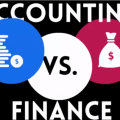In a nutshell: What’s right for you — a degree in finance or accounting?
You have a head for numbers and a desire to go into a financial field.
But one question often arises: Should I get a degree in finance or accounting?
The good news is both fields provide challenging, yet rewarding career possibilities vital to a successful business operation. Both fields show faster than average career growth through 2024, according to the U.S. Bureau of Labor Statistics.
Finance and accounting are two different functions. It’s important for you to take the time to explore the differences and decide which profession best suits your career goals and abilities.
Accounting and Finance Defined
Accounting is a job that requires you to handle concrete numbers, such as those in found in financial records. Tasks usually include dealing with budgets, audits, taxes and the day-to-day financial operations of an organization.
Finance, on the other hand, requires skills in the management of investments. Financial analysts study the stock and bond markets, determining good places for both organizations and individuals to place their money. They are usually involved with projected returns on investments and overall money strategies. You are looking forward to what can happen tomorrow, not managing the day-to-day revenue flow.
Degrees in Accounting and Finance
You will find much of what you learn for both finance and accounting can overlap.
Certain core strengths are needed for both. Examples include strong computational math skills, quantitative analysis, business and financial administration, and the ability to present findings in a way that is easily understood by executives and department managers.
That latter skill is necessary because much of what financial analysts and accountants produce is used by business leaders to determine and develop strategies for the future.
If you pursue a degree in accounting, coursework typically includes business law, business administration, marketing, accounting ethics, statistics, accounting theory, fraud, taxation and cost management.
For those who enter a degree program in financial analysis, coursework typically includes portfolio management, international and domestic finance and trade, risk management, corporate finance and financial engineering.
Careers in Accounting
Most of those who enter the accounting field choose from two main options: accounting or auditing.
Accountants
Within accounting, there are many career possibilities. Becoming a Certified Public Accountant, which requires passing an exam after meeting educational requirements, may be required.
- Public accountant. You will manage all the financial documents that are open to the public, typically for corporations, individuals or government agencies. You may also focus on tax law and the preparation of taxes.
- Forensic accountant. You will analyze financial statements, often working within the legal system. Forensic accountants examine finances to find improper activity that can include embezzlement, securities fraud or contract violations.
- Management accountant. You are typically charged with overseeing finances for private companies, such as budgets and other internal financial documents, as well as conducting risk analysis and cost analytics.
- Government accountant. You specialize in financial operations subject to government oversight or those conducted by the government itself.
Auditors
If you choose to go into auditing, expect to work for an outside consultant company, not necessarily for a corporation or organization (although there are exceptions). Typically, auditors are hired to review an organization’s financial statements. The goal is to ensure all financial records have been handled appropriately.
In some cases, auditors are brought in to search for financial improprieties or mismanagement.
Careers in Finance
If you go into finance, you might specialize in certain specific areas. You typically will work within the company itself, although in some cases analysts are hired from outside consultants. The latter is almost always the case with individuals. Some of the specialties within finance can include the following:
- Fund managers. You focus on buying, selling and projecting the future value of hedge or mutual funds.
- Portfolio managers. The focus here is on overseeing the investment mix of an individual or organizational investment portfolio, including stocks, bonds and real estate.
- Ratings analysts. You specialize in assessing a business or government’s ability to repay its debts.
- Risk analysis. This involves projecting the return on a specific investment and the risk of a loss.
- Buy-side analysts. You specialize in investment procurement and management strategy for the client.
- Sell-side analysts. You provide advice to sales teams on when to disburse stocks, bonds and other financial products.
The Bottom Line
Clearly, both accounting and finance offer a wide variety of career possibilities. But one factor exists outside of facts, figures and job descriptions: your own personality.
In general, those who become accountants must be extremely detail-oriented, with strong organizational, quantitative and analytical skills. The job requires both precision and discipline. Accountants also experience more success when they have the ability to self-manage and work independently.
While much of this also applies to financial analysts, they need to be accurate with projections and make good decisions quickly. Results are the bottom line in finance, meaning you will need both confidence and strong communication skills.
Whichever path you choose, both the challenges and rewards can be substantial.






